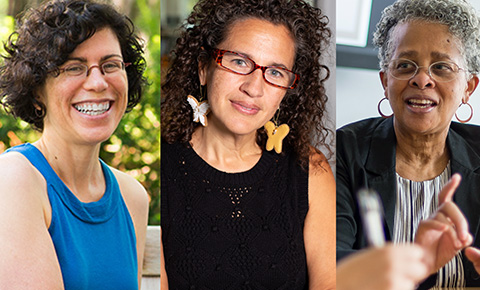New Guidance Aims to Strengthen Education Research

A new Spencer Foundation report calls for a new approach to graduate education to better prepare researchers to improve schools and communities.
The report, coauthored by a task force that includes Northwestern University professors Megan Bang, Cynthia Coburn and professor emerita Carol Lee, focuses on how to help future and current scholars learn in ways that respond to changing classrooms, communities, and social conditions. Because many experienced researchers also mentor others, their continued growth is seen as key to lasting change, they say.
The report is based on the ideas that schools and education systems are complex, that differences among people and communities are strengths that can drive improvement and that adults who work to support student learning also need ongoing learning themselves.
The recommendations highlights six important areas researchers should learn about:
- Working with communities – building strong, respectful partnerships with schools and families.
- Using different ways of thinking – drawing on ideas from many fields.
- Using different research methods – choosing tools that best fit the questions being asked.
- Ethical research – ensuring honesty, fairness, and care for participants.
- Using digital tools – taking advantage of technology for learning and research.
- Sharing results effectively – helping research make a real difference in schools and communities.
The task force also recommends focusing on how institutions can support this kind of preparation, such as building teamwork structures, designing flexible graduate programs, improving university policies, and creating partnerships across institutions. The report also encourages publishers, funders, and policymakers to support these efforts.
Overall, the report offers a guide for reflection and planning at every level—from individual researchers to universities and professional groups. The goal is to train researchers who can work with communities to create fairer, stronger, and more effective education systems.
The task force began the work in May 2023 and completed it in January 2025, before the new federal administration took office and education policy shifted radically.
“Life in universities and schools of education is challenging and uncertain,” they wrote, citing drastic reductions in funding for research, a severely diminished research infrastructure, and widespread questioning about the value universities provide to society.
The report, they said, can serve as a resource in these challenging times. The current social and political circumstances make working together even more urgent.
“Transformative research, as envisioned here, can and will create new ways to work together for better futures —even though our current day-to-day reality challenges us to evolve more rapidly than we ever dreamed at the inception of this report,” they wrote. “We hope our report can serve as a resource for dialogue and change efforts — within and across the institutions in which we work – to imagine and build together toward a sustainable future where everyone in educational systems and the communities they serve can learn and thrive.”
Megan Bang
Megan Bang is the James Johnson Professor of Learning Sciences. She studies how culture, learning, and development interact, with a focus on how people navigate multiple ways of making meaning to create more effective and just learning environments in STEAM education. She works closely with Indigenous communities and conducts research in both schools and informal settings across the life course. She currently serves on the Board of Advisors for the MacArthur Foundation, the Board of National Academy of Education and is a member of American Academy of Arts and Sciences, and a fellow of AERA and the International Society for the Learning Sciences.
Carol D. Lee
Carol D. Lee is the Edwina S. Tarry Professor Emerita in the School of Education and Social Policy. She is the immediate Past President of the National Academy of Education, a Past President of the American Educational Research Association, and a fellow of AERA, American Academy of Arts and Sciences, International Society for the Learning Sciences, the Reading Hall of Fame, and National Conference on Language and Literacy. Her research focuses on cultural supports for learning, both holistic development and disciplinary literacies. She is a former high school English teacher and founder of three three African-centered schools in Chicago spanning 50 years.
Cynthia Coburn
Cynthia Coburn is the Margaret Walker Alexander Professor of Learning Sciences and Human Development and Social Policy. She studies the relationship between instructional policy and teachers’ classroom practices in urban schools, the dynamics of school district policy making, spread and scale of educational innovations, and the relationship between research and practice for school improvement. She is a Fellow of the American Educational Research Association and an elected member of both the National Academy of Education and the American Academy of Arts and Sciences. Coburn has a bachelor's in philosophy from Oberlin College, and a master's in sociology and a PhD in education from Stanford University.
In addition to Bang, Coburn, and Lee, coauthors of the report include:
-
Alex J. Bowers, Professor of Education Leadership at Teachers College, Columbia University;
-
Ezekiel Dixon-Román, Professor of Critical Race, Media, & Educational Studies at Teachers College, Columbia University;
-
Kara S. Finnigan (ex officio), Professor at the University of Michigan;
-
Louis M. Gomez (co-chair, editor), learning scientist and Distinguished Professor of Education at the University of California, Los Angeles;
-
Andrew Ho, Charles William Eliot Professor of Education at the Harvard Graduate School of Education;
-
Pamela A. Moss (co-chair, editor), the John Dewey Collegiate Professor of Education in the Marsal Family School of Education at the University of Michigan;
-
Richard Murnane, economist and Thompson Research Professor at the Harvard Graduate School of Education;
-
Na’ilah Suad Nasir (ex officio); President, Spencer Foundation;
-
William R. Penuel (editor), Distinguished Professor in the Institute of Cognitive Science and School of Education at the University of Colorado Boulder.